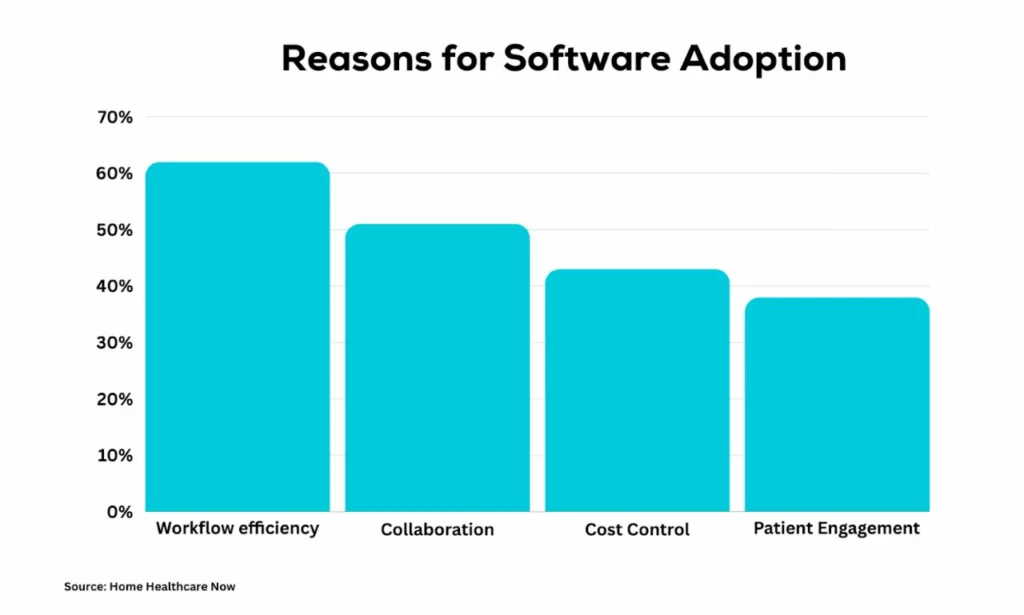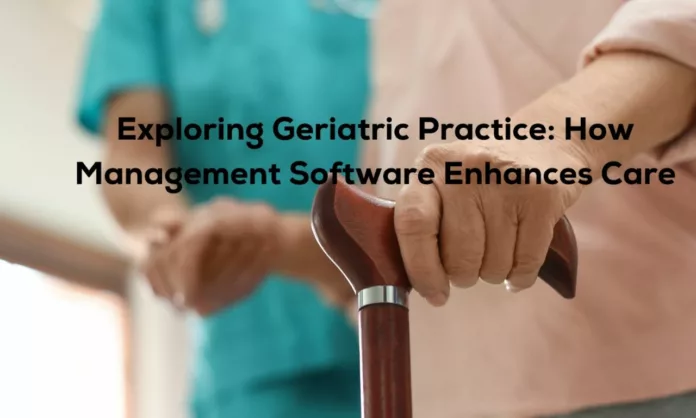As we witness a significant shift in global demographics, with an increasing segment of the population entering their golden years, the necessity for specialized and attentive elderly care has never been more critical. Geriatric practices are at a crossroads, facing the challenge of personalizing services for a growing demographic. In this pivotal era, the role of management software emerges as a game-changer, revolutionizing how care is delivered by simplifying complex tasks and fostering efficient care coordination. Read on to learn what is practice management software and how it enhances elder care.
Table of Contents
Understanding Geriatric Practice Management Software
At the core of geriatric healthcare is a holistic approach designed to meet the unique needs of the elderly. This is where practice management software comes into play. Let’s delve into what this software is and how it remarkably transforms elder care.
This sophisticated tool is engineered to streamline administrative functions, enhance communication efficiency, and optimize workflow within healthcare settings. By automating critical processes like appointment scheduling and secure patient record management, this software becomes a powerful ally for geriatric practitioners. It paves the way for improved communication among healthcare professionals, leading to a more organized, patient-focused approach. The ultimate benefit? Geriatric practitioners can devote more time to crafting personalized care and treatment plans, precisely addressing the specific needs of their elderly patients. The integration of this software into geriatric practices not only boosts efficiency but also plays a crucial role in providing compassionate, effective healthcare for the aging population.
Advancing Elderly Healthcare with Tailored Software Solutions
Geriatric care management software offers customized solutions designed to meet the complex needs of elderly patients, encompassing medical, emotional, and social aspects. Features like built-in analytics aid in simplifying patient data analysis, while intuitive workflows and templates help standardize care plan development. Such capabilities offer clinics a deeper understanding of health trends, facilitating timely interventions.
With integrated health records presented through interactive dashboards, practitioners gain valuable insights into health patterns, making it easier to identify risks early on. Research in the industry suggests that specialized software can cut documentation time in half compared to traditional systems, while also reducing redundancy in patient records significantly. As patient loads increase, these optimized workflows are key to superior care delivery.

Streamlining Care Coordination Across Diverse Healthcare Teams
Effective senior care demands coordination among a variety of healthcare providers, from doctors and therapists to nutritionists and social workers. The challenge lies in ensuring that communication among these groups is cohesive and efficient, preventing delays in care, medication errors, and fragmented patient experiences.
Management software serves as a central hub for communication and data sharing, using electronic health records (EHRs) as its foundation. Secure messaging platforms within the software enable care teams to align on treatment plans seamlessly, while built-in alert systems keep everyone informed about critical updates like missed appointments or medication changes. This centralized coordination model ensures an integrated, comprehensive approach to elderly care.
Key Benefits of Elderly Care Management Software
These specialized platforms play a vital role in centralizing coordination, offering stakeholders access to integrated EHRs in a secure, HIPAA-compliant environment. The software provides various professionals with the tools they need:
- Schedulers and billing staff gain insights from dashboard views of appointments and insurance details.
- Social workers can access detailed psychosocial histories.
- Physicians review in-depth medical reports.
- Centralized messaging enables swift alignment on treatment plans and follow-ups.
- Custom referral forms streamline patient routing to necessary therapy services.
- Automated alerts keep care coordinators informed about important updates.
By breaking down information silos, this centralized approach ensures that every aspect of elderly care is harmonized, aligning various care providers around the patient’s needs.
Scalable Solutions for Diverse Practice Sizes
The versatility of geriatric care software is evident in its ability to adapt to practices of varying sizes. For solo practitioners, it simplifies schedule and record management through mobile devices. For larger hospitals, it provides demographic insights by analyzing trends from extensive patient data. Features like touchscreen check-ins and offline data access are critical in optimizing care efficiency, regardless of the size of the organization.
Leading research firms report that over two-thirds of geriatric practices now use cloud-based software, which is essential for this increasingly mobile demographic, offering accessibility across various care settings.
Selecting the Right Software for Your Practice
In today’s technology-driven landscape, choosing the right software is a crucial decision for geriatric practice owners. The ideal software balances features, interoperability, and cost-efficiency, catering to specific practice goals. For instance, practices focused on care coordination might prioritize tools for referral management and health information exchanges. Identifying these specific needs is the first step towards implementing a solution that truly aligns with your practice’s goals.
Enhancing Communication Among Healthcare Professionals
Effective communication is the backbone of geriatric practice. Management software plays a pivotal role in ensuring seamless information flow, providing centralized platforms for sharing patient information, test results, and treatment plans. This integrated approach minimizes information gaps, allowing healthcare professionals to make informed decisions swiftly. With secure messaging systems and integrated communication tools, the software fosters a collaborative environment, thereby enhancing the overall quality of senior care.
FAQs
- Key Features: Workflow automation, integrated health records, care coordination tools, built-in analytics, and mobile accessibility are some core features. Touchscreens and offline access are also essential for elderly patients.
- Elderly Patient Catering: The software typically includes features like larger interfaces and text-to-speech, tailored for geriatric patients. Analytics play a crucial role in identifying health trends, while coordination tools ensure timely, integrated care.
- Selecting Software: Considerations include cloud accessibility, interoperability, user-friendly interface, support availability, and tools aligning with practice objectives like analytics and patient engagement.
Conclusion
In an era where clinical and operational complexities are increasing, managing software innovation becomes crucial in empowering geriatric practices to enhance care quality and efficiency. As the demand for elderly care grows, the symbiotic advancement of technology and healthcare is essential. At the heart of this mission is the transformative power of management software, ready to redefine the future of geriatric care.

